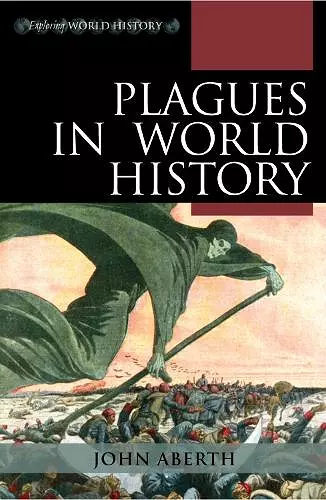Plagues in World History
Format:Paperback
Publisher:Bloomsbury Publishing PLC
Published:14th Dec '15
Currently unavailable, and unfortunately no date known when it will be back

Plagues in World History provides a concise, comparative world history of catastrophic infectious diseases, including plague, smallpox, tuberculosis, cholera, influenza, and AIDS. Geographically, these diseases have spread across the entire globe; temporally, they stretch from the sixth century to the present. John Aberth considers not only the varied impact that disease has had upon human history but also the many ways in which people have been able to influence diseases simply through their cultural attitudes toward them. The author argues that the ability of humans to alter disease, even without the modern wonders of antibiotic drugs and other medical treatments, is an even more crucial lesson to learn now that AIDS, swine flu, multidrug-resistant tuberculosis, and other seemingly incurable illnesses have raged worldwide. Aberth's comparative analysis of how different societies have responded in the past to disease illuminates what cultural approaches have been and may continue to be most effective in combating the plagues of today.
Medieval historian Aberth presents interactions of humans and epidemics in case studies of six infectious diseases: plague, smallpox, tuberculosis, cholera, influenza, and AIDS. He chose these because they have known pathogens, can be fatal, and have had long histories. Not merely narrative or descriptive, his study is an attempt to demonstrate how human reactions and attitudes to these diseases have in turn shaped how they affect human communities. Going beyond an exercise in the social construction of disease, Aberth's historical focus on the interaction of disease and human response leads him to be optimistic about human abilities to adjust to and even neutralize biomedical effects. The longest chapter, on the plague, reflects the author's professional specialty. The second longest chapter is on AIDS; remaining chapters are 9-24 pages. Aberth's detailed attention to Islamic understandings of and reactions to plague is especially welcome. He opens each chapter by describing the disease and its effects, then for each disease develops unique reactions and attitudes as well as points introduced earlier, weaving an overall pattern of human progress and intransigence, of connections made and opportunities missed. Summing Up: Highly recommended. * CHOICE *
The prospect of a slender volume about plagues in world history would certainly be attractive to all those who teach either disease history or world history. Moreover . . . it is an approach that most students would embrace. * Journal of Interdisciplinary History *
John Aberth offers a social interpretation of disease throughout history using a comparative global framework. He has a lively writing style, and each chapter is framed by lucid summary descriptions of disease symptoms, progression, transmission, treatments, and the respective debates. Plagues in World History should be a profitable and successful textbook for undergraduate students and general readers. * Journal of World History *
The author presents an effective case for the diseases he has chosen and provides the reader with current findings that allow for interpretations of disease origins. * The Historian *
John Aberth has written a concise book that is both well-informed and clear about contemporary medical understandings of epidemics, and steadily conscious of their broader historical, political, social, and economic contexts. In an age when such epidemics as malaria, tuberculosis, and AIDS affect millions, Aberth's arguments have continuing importance. -- J. N. Hays, Loyola University, Chicago
Seeking understanding of our societies and selves by reading and writing books that omit all mention of the essential fact of wars would strike us as a glaring oversight. Yet our shelves are crammed with books that never mention epidemics, an equally vital force in human history. Plagues in World History is the authoritative and fascinating antidote to that error. -- Alfred W. Crosby, University of Texas at Austin
ISBN: 9780742557062
Dimensions: 233mm x 157mm x 19mm
Weight: 399g
256 pages